Unit 2 Poems (Using language)
文档属性
| 名称 | Unit 2 Poems (Using language) | 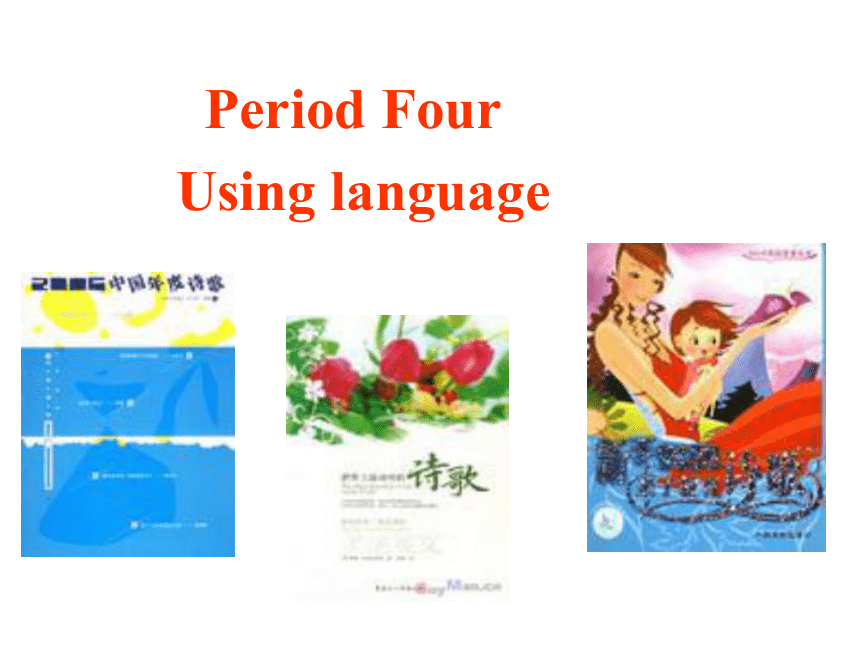 | |
| 格式 | rar | ||
| 文件大小 | 3.0MB | ||
| 资源类型 | 教案 | ||
| 版本资源 | 人教版(新课程标准) | ||
| 科目 | 英语 | ||
| 更新时间 | 2009-03-19 12:03:00 | ||
图片预览

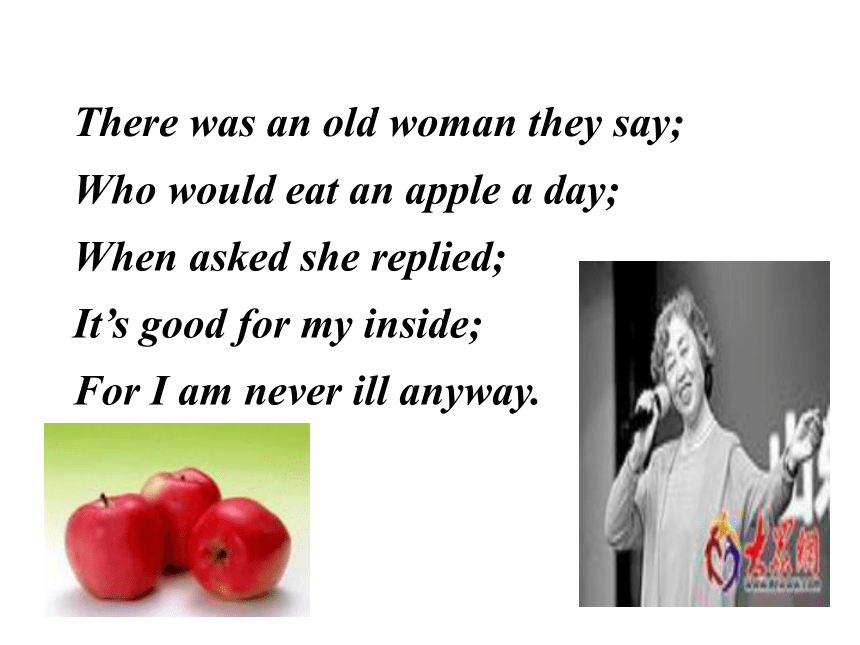
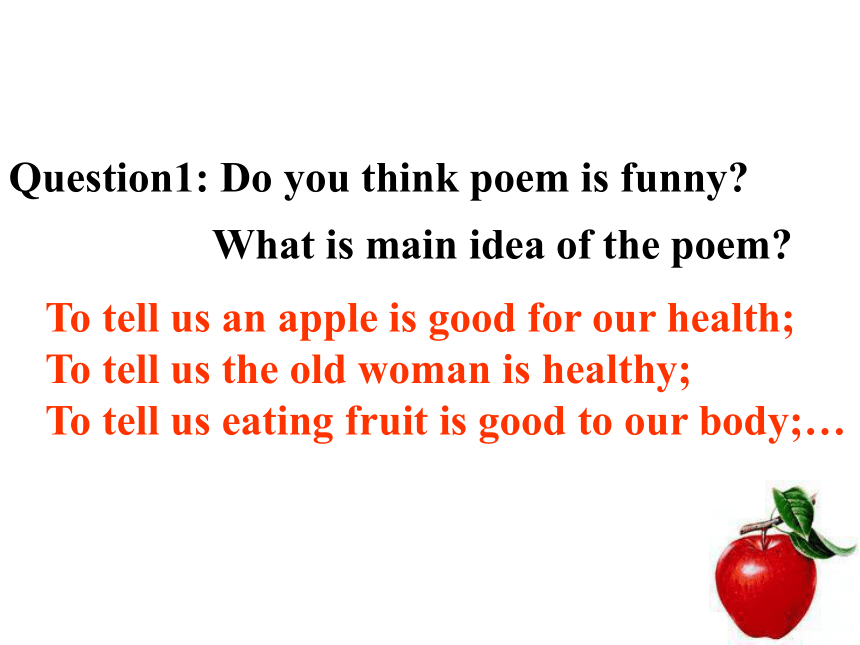
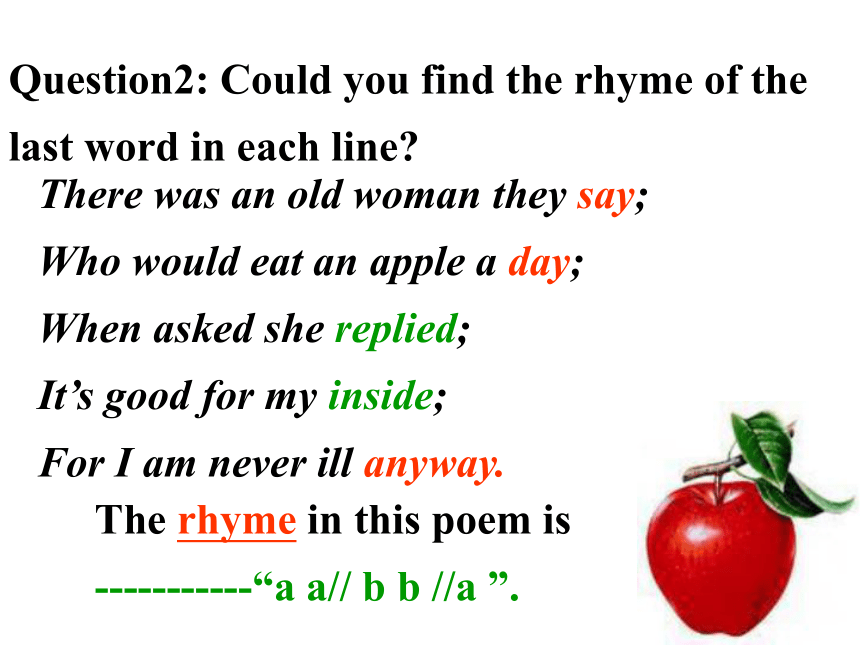
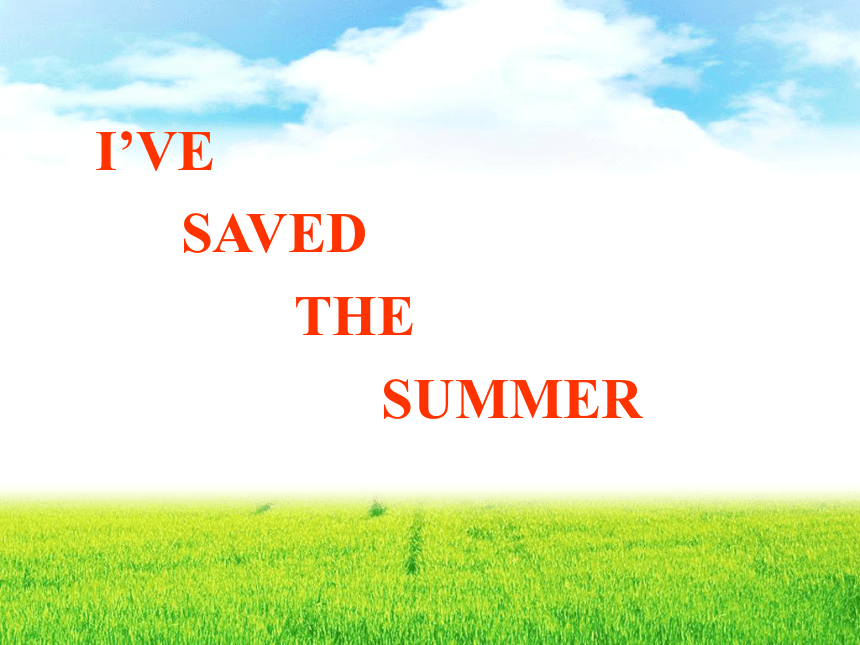
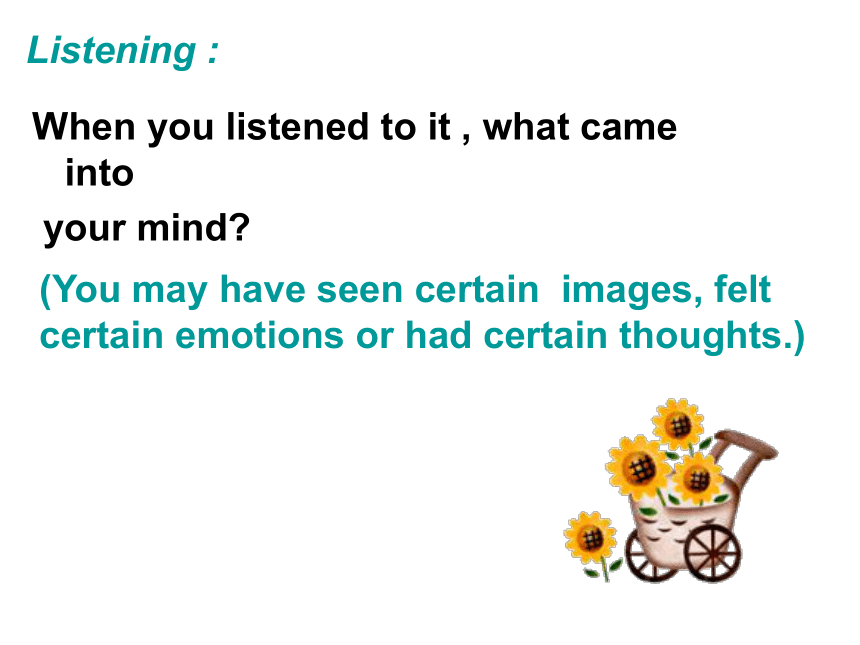
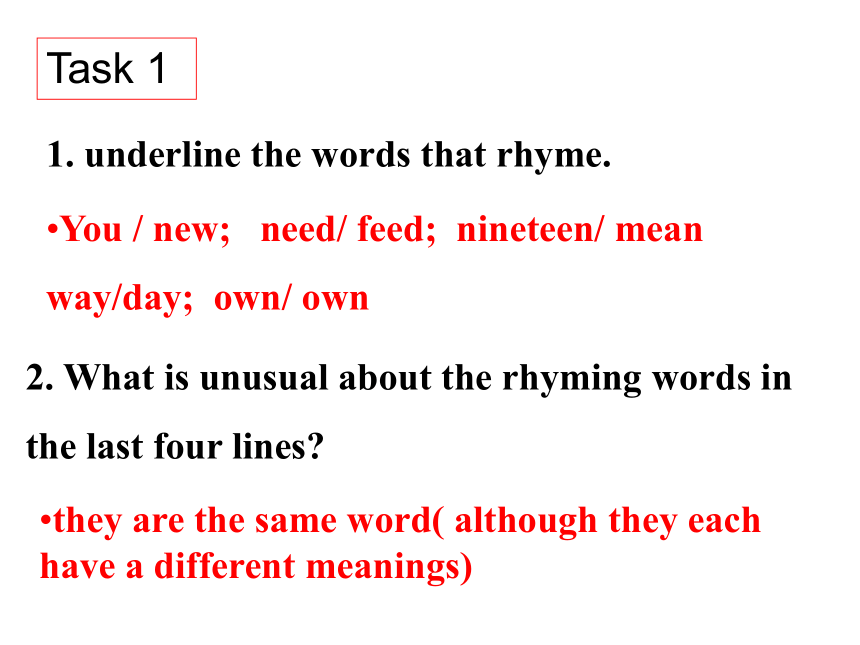
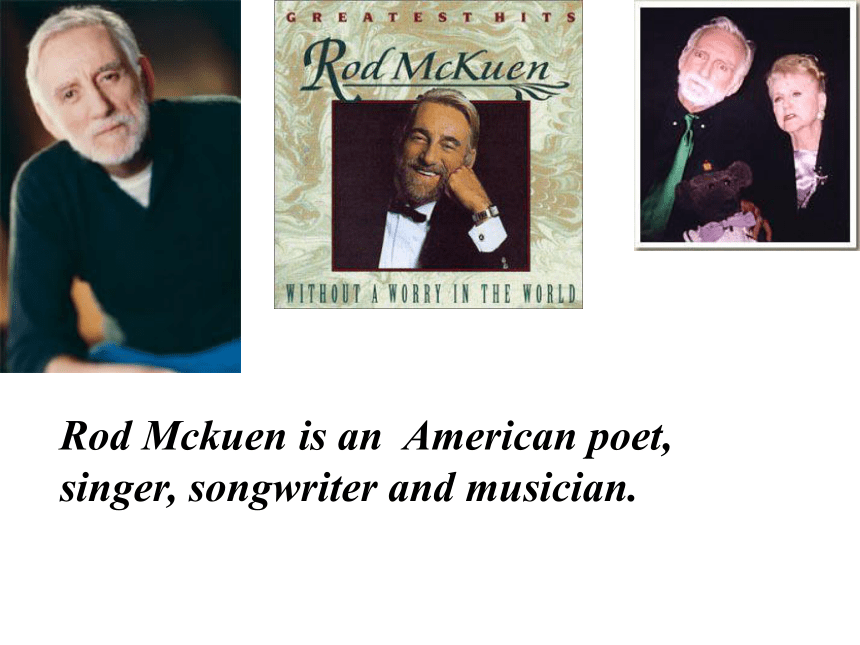
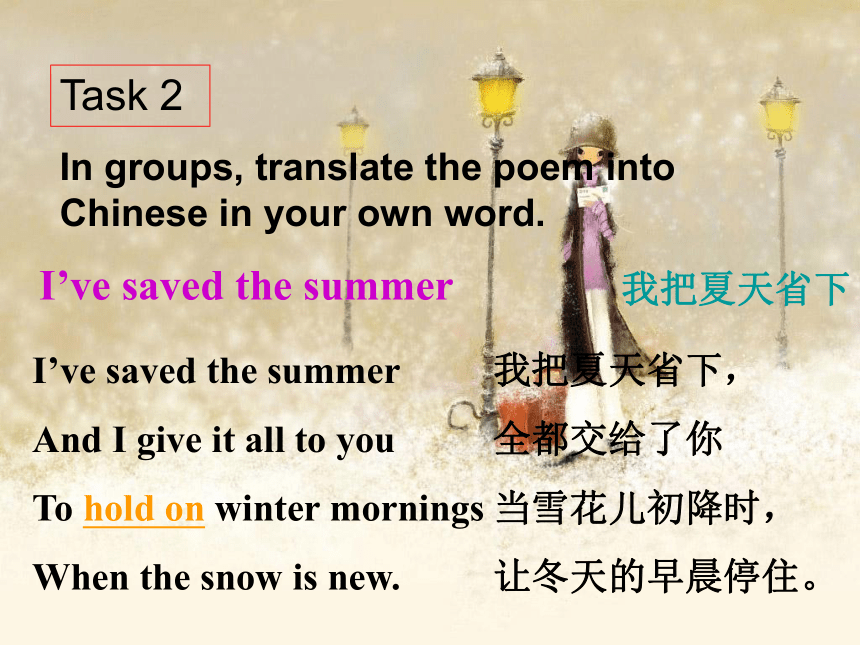
文档简介
课件23张PPT。 Period Four
Using languageThere was an old woman they say;
Who would eat an apple a day;
When asked she replied;
It’s good for my inside;
For I am never ill anyway.
Question1: Do you think poem is funny?
What is main idea of the poem?To tell us an apple is good for our health;
To tell us the old woman is healthy;
To tell us eating fruit is good to our body;…There was an old woman they say;
Who would eat an apple a day;
When asked she replied;
It’s good for my inside;
For I am never ill anyway.Question2: Could you find the rhyme of the last word in each line?
The rhyme in this poem is
-----------“a a// b b //a ”. I’VE
SAVED
THE
SUMMERListening :
(You may have seen certain images, felt certain emotions or had certain thoughts.)When you listened to it , what came into
your mind?Task 11. underline the words that rhyme. You / new; need/ feed; nineteen/ mean
way/day; own/ own2. What is unusual about the rhyming words in
the last four lines?they are the same word( although they each have a different meanings)Rod Mckuen is an American poet, singer, songwriter and musician. Task 2In groups, translate the poem into Chinese in your own word.I’ve saved the summer
And I give it all to you
To hold on winter mornings
When the snow is new.I’ve saved the summer我把夏天省下我把夏天省下,
全都交给了你
当雪花儿初降时,
让冬天的早晨停住。I’ve saved some sunlight
If you should ever need
A place away from darkness
Where your mind can feed.我把阳光省下,
以供你不时之需
在那远离黑暗的地方,
你的心灵会得到养料。And for myself I’ve kept your smile
When you were but nineteen
Till you’re older you’ll not know
What brave young smile can mean.那年你芳龄十九,
我就珍藏了你的微笑
等你长大成人之后,
才知道年轻勇敢的微笑的奥秘。I know no answers
To help you on your way
The answers lie somewhere
At the bottom of the day.我不知道有什么办法,
帮你踏上你人生的旅程
办法也许就在某处,
在白天结束的那个时辰。But if you’ve a need for love
I’ll give you all I own
It might help you down the road
Till you’ve found your own.如果你需要爱,
我会献上我的所有的爱
它也许能帮你踏上旅途
直到你找到属于自己的爱Who is the speaker in the poem and who is he/she speaking to? Give reasons to support your answer.A parent (father/mother) is speaking to a young adult child ( son or daughter).Task 3Supportive sentences:① Till you are older you’ll not know … --- imply the speaker is much older than the young person ( that is, till you are old like me).② I’ve saved the summer and I’ve saved some sunlight .--- imply the speaker is an older person who has experienced their own journey through life and who is offering love to help him/her.③ But if you’ve a need for love
I’ll give you all I own … We know that the speaker is probably a parent because he / she is offering the child unconditional love.④ when you were but nineteenWe know the child is an adult because the speaker refers to the time when you were but nineteen.Which of the following is the closest to the speaker’s message? Give a reason for your choice.
A If it’s cold, I’ll warm you; if it’s dark, I’ll give you light; if you’re hungry, I’ll feed you; if you want love, I will give it to you.
B Although the future may be difficult for you, whenever you need warmth and love, remember I’ll have some to give you.
C While you’re away I’ll remember your smile and I’ll love you always. When you return, I hope you will love me.
Reading Task of page 52Reading II---- detailed reading(3m)A SPRING MORNINGWhen you read each poem, did it make you
feel something or think about something?
If so, explain it.Words for you: lovely, cheerful, marvelous, beautiful, wonderful, splendid … In groups of three, discuss and then write about the characteristics of each poem. number of lines number of syllables rhythm rhyme repetition certain part of speechPoem A (Tang poem)____________________
____________________
Poem B (adverb poem)___________________
___________________
beautiful imagery that conveys deep feelingstwo sets of four lines
Regular strong beatPoem C (song)__________________________
Poem D (cinquain)_______________________
Poem E (haiku)__________________________regular strong beat; two pairs of rhyming linesfive linesthree lines
Using languageThere was an old woman they say;
Who would eat an apple a day;
When asked she replied;
It’s good for my inside;
For I am never ill anyway.
Question1: Do you think poem is funny?
What is main idea of the poem?To tell us an apple is good for our health;
To tell us the old woman is healthy;
To tell us eating fruit is good to our body;…There was an old woman they say;
Who would eat an apple a day;
When asked she replied;
It’s good for my inside;
For I am never ill anyway.Question2: Could you find the rhyme of the last word in each line?
The rhyme in this poem is
-----------“a a// b b //a ”. I’VE
SAVED
THE
SUMMERListening :
(You may have seen certain images, felt certain emotions or had certain thoughts.)When you listened to it , what came into
your mind?Task 11. underline the words that rhyme. You / new; need/ feed; nineteen/ mean
way/day; own/ own2. What is unusual about the rhyming words in
the last four lines?they are the same word( although they each have a different meanings)Rod Mckuen is an American poet, singer, songwriter and musician. Task 2In groups, translate the poem into Chinese in your own word.I’ve saved the summer
And I give it all to you
To hold on winter mornings
When the snow is new.I’ve saved the summer我把夏天省下我把夏天省下,
全都交给了你
当雪花儿初降时,
让冬天的早晨停住。I’ve saved some sunlight
If you should ever need
A place away from darkness
Where your mind can feed.我把阳光省下,
以供你不时之需
在那远离黑暗的地方,
你的心灵会得到养料。And for myself I’ve kept your smile
When you were but nineteen
Till you’re older you’ll not know
What brave young smile can mean.那年你芳龄十九,
我就珍藏了你的微笑
等你长大成人之后,
才知道年轻勇敢的微笑的奥秘。I know no answers
To help you on your way
The answers lie somewhere
At the bottom of the day.我不知道有什么办法,
帮你踏上你人生的旅程
办法也许就在某处,
在白天结束的那个时辰。But if you’ve a need for love
I’ll give you all I own
It might help you down the road
Till you’ve found your own.如果你需要爱,
我会献上我的所有的爱
它也许能帮你踏上旅途
直到你找到属于自己的爱Who is the speaker in the poem and who is he/she speaking to? Give reasons to support your answer.A parent (father/mother) is speaking to a young adult child ( son or daughter).Task 3Supportive sentences:① Till you are older you’ll not know … --- imply the speaker is much older than the young person ( that is, till you are old like me).② I’ve saved the summer and I’ve saved some sunlight .--- imply the speaker is an older person who has experienced their own journey through life and who is offering love to help him/her.③ But if you’ve a need for love
I’ll give you all I own … We know that the speaker is probably a parent because he / she is offering the child unconditional love.④ when you were but nineteenWe know the child is an adult because the speaker refers to the time when you were but nineteen.Which of the following is the closest to the speaker’s message? Give a reason for your choice.
A If it’s cold, I’ll warm you; if it’s dark, I’ll give you light; if you’re hungry, I’ll feed you; if you want love, I will give it to you.
B Although the future may be difficult for you, whenever you need warmth and love, remember I’ll have some to give you.
C While you’re away I’ll remember your smile and I’ll love you always. When you return, I hope you will love me.
Reading Task of page 52Reading II---- detailed reading(3m)A SPRING MORNINGWhen you read each poem, did it make you
feel something or think about something?
If so, explain it.Words for you: lovely, cheerful, marvelous, beautiful, wonderful, splendid … In groups of three, discuss and then write about the characteristics of each poem. number of lines number of syllables rhythm rhyme repetition certain part of speechPoem A (Tang poem)____________________
____________________
Poem B (adverb poem)___________________
___________________
beautiful imagery that conveys deep feelingstwo sets of four lines
Regular strong beatPoem C (song)__________________________
Poem D (cinquain)_______________________
Poem E (haiku)__________________________regular strong beat; two pairs of rhyming linesfive linesthree lines
